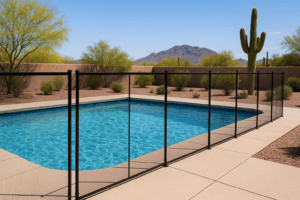Owning a pool comes with great responsibility, and ensuring that your pool fence complies with regulations is not just a matter of safety but also legality. In this article, we’ll discuss the importance of adhering to pool fence regulations and how to keep your pool area legal.
Contents
The Importance of Pool Fence Regulations
Pool fence regulations are in place to protect lives, especially those of young children. Drowning is a leading cause of accidental death among children, and pool fences are a crucial line of defense. Compliance with regulations ensures that your pool area is as safe as possible.
Understanding Local Regulations
It’s essential to familiarize yourself with the pool fence regulations specific to your locality, as they can vary. Here are some common aspects that regulations may address:
1. Fence Height
Regulations often specify the minimum height required for a pool fence. This height is designed to deter children from climbing over the fence.
2. Gate Requirements
Most regulations require that pool gates be self-closing and self-latching. The gate should also open away from the pool area.
3. Spacing
The spacing between fence posts or panels is usually regulated to prevent children from squeezing through.
4. Materials
Some regulations may dictate the type of materials that are acceptable for pool fences, such as metal, glass, or mesh.
5. Pool Access
Regulations may also require alarms or safety measures for pool access points, such as doors leading from the house to the pool area.
Staying Compliant
Here’s how to ensure your pool fence remains compliant with regulations:
1. Regular Inspections
Frequently inspect your pool fence to ensure it remains in compliance with local regulations. Look for any loose or damaged components, and address them promptly.
2. Keep the Area Clear
Ensure that the area around your pool fence is clear of objects that could be used to climb over it. Trim back vegetation and remove any potential hazards.
3. Maintenance
Regularly maintain your pool fence by cleaning and performing any necessary repairs. Rust, corrosion, or wear and tear should be addressed promptly to maintain compliance.
4. Gate Functionality
Regularly test the functionality of your pool gate. Ensure that it self-closes and self-latches as required by regulations.
5. Professional Inspection
Consider scheduling a professional inspection of your pool fence to identify any compliance issues that may not be apparent during routine checks.
The Consequences of Non-Compliance
Failure to comply with pool fence regulations can have serious consequences, both legally and in terms of safety:
- Legal Consequences: Non-compliance with pool fence regulations can result in fines, penalties, and legal issues. You may be held liable for accidents that occur in your pool area if it is not in compliance.
- Safety Risks: Non-compliance poses significant safety risks, especially to young children. A compliant pool fence is a vital barrier that can prevent accidents and save lives.
Conclusion
Keeping your pool legal and safe is a shared responsibility. By understanding and adhering to pool fence regulations, you not only protect yourself from legal troubles but also contribute to the safety of your family, friends, and neighbors. Remember, if you have any questions or need assistance with ensuring your pool fence compliance, don’t hesitate to contact us at 480-771-8026 or visit PoolSafetyFencing.com. We’re here to help you keep your pool area secure and compliant.




